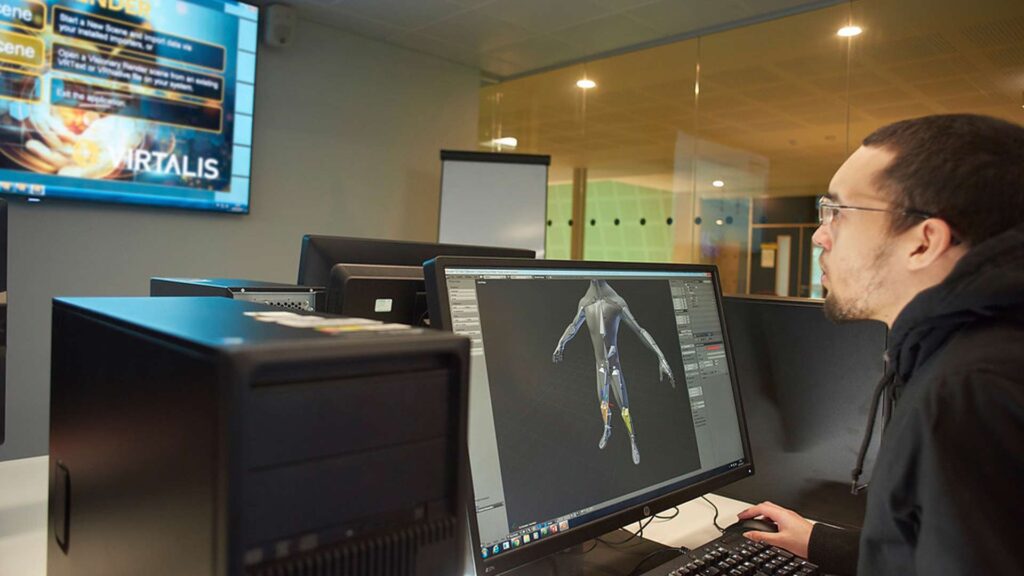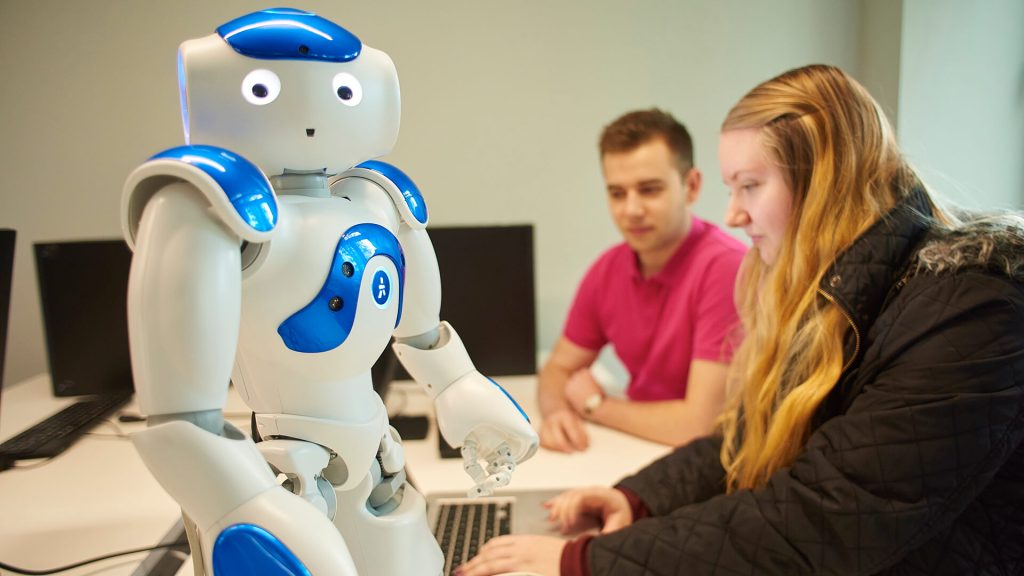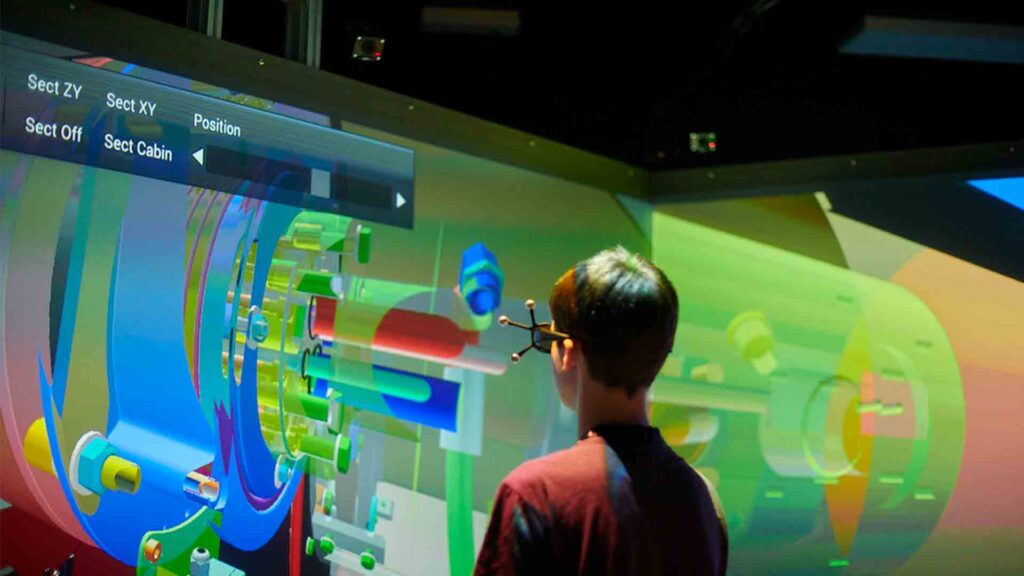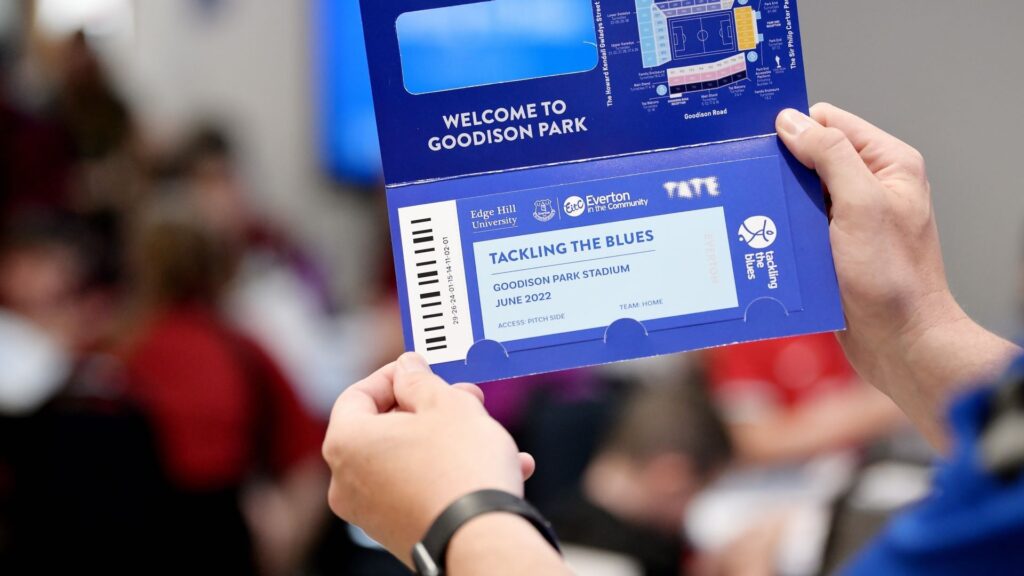Computer Science & Artificial Intelligence BSc (Hons)
UCAS code: I1I4
Can computers think like humans? Ask the big questions and demystify the computer science behind artificial intelligence (AI) as you learn to create the systems, games and applications of the future.
Overview
| Course length: | 3 years full-time Typically 4.5 years part-time |
|---|---|
| Start dates: | September 2024 September 2025 |
| Location: | Edge Hill University |
| Example offers: | BBC-BBB (A Level) or DMM (BTEC) View full entry criteria |
| Subject(s): | Computer Science |
| Faculty: | Arts and Sciences |
| Department: | Computer Science |
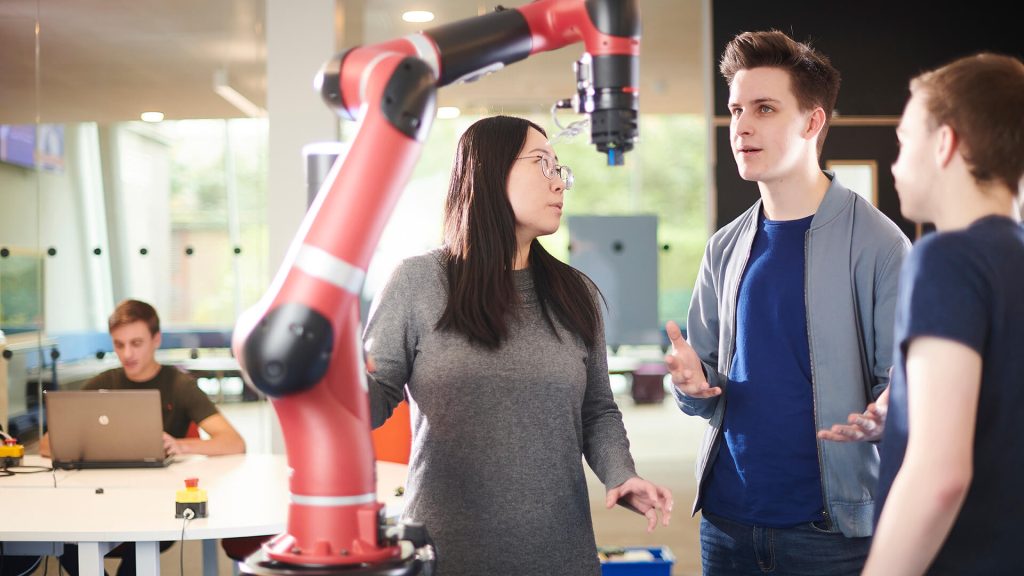
Computers can see us, talk to us, and increasingly make decisions like us. On this course, you’ll explore how intelligence works and use that knowledge to design programmes and systems that make life better.
This is a fast-moving speciality built around a set of core skills. You will develop a strong foundation in computer science and AI by studying programming, mathematics, autonomous secure systems, intelligent systems, and data analytics.
Artificial intelligence meshes together different computing techniques to create new solutions. We teach you to create AI tools and rate their success. You’ll also work in robotics as you start to picture where you can take AI next.
Robotics and automated systems that utilise artificial intelligence help with medical diagnostics, gaming, and manufacturing. AI is in your home and school. Soon it will help every part of society. Our degree in computer science and artificial intelligence gives you the expertise to work in this exciting profession.
Course features
-
International students can apply
-
Sandwich year option available
-
Studying abroad option available
-
Work placement opportunity
What you'll study
We packed Year 1 with the fundamentals of the digital world. You’ll look at computer architecture, networks and professional practice. We will also teach you about software development, key mathematical concepts and the foundations of computer science. It is important to us that you feel confident in your core knowledge as you move up to Years 2 and 3.
In Year 2, we want you to get hands on. You’ll strengthen your programming skills for complex tasks and use multi-sensors in robotics. You’ll make recommendations as a data analyst and explore computer forensics. At the same time, you’ll deepen your knowledge of the ideas behind computer science and AI. We care about your future: our employability module helps you develop transferable skills. You can also take a year in industry before beginning Year 3.
Become an AI specialist in your final year. Focus on the theories and practical aspects of artificial intelligence. Learn to design user-friendly human-robot interaction systems. Understand smart devices. Dive into the AI techniques behind popular games. Bring it all together to create your own piece of software in a research and development project, and graduate with highly desirable real-world skills.
How you'll study
Teaching methods are designed in consultation with leading employers in the region. Many classes are based in computer laboratories, focusing on student activity as a means of learning. We introduce theoretical concepts by building on practical activity.
Classes are highly interactive, with the practical application of concepts a key factor, as well as cases drawn from real-life. Workshops, seminars, group tutorials and practical activities provide opportunities for you to work interdependently.
To enhance your employability, you will be given opportunities to work together and develop the essential people skills to complement your technical ability.
How you'll be assessed
You will be assessed through a combination of practical exercises, reports, essays, presentations and examinations. We want you to develop the ability to work effectively both independently and as part of a team, therefore assessment includes both of these forms, though the emphasis is strongly on individual work.
Who will be teaching you
You will be taught by staff who are passionate about student learning and development. The programme team are specialists in computing and are active researchers in areas including artificial intelligence, machine learning, intelligent systems, distributed systems, mobile computing, data science and web information architecture. Academic staff are regular contributors to conferences and journals, engaging with the wider business and academic environment in disseminating knowledge and delivering impact.
Entry criteria
Entry requirements
Typical offer 112-120 UCAS Tariff points, for which no specific subjects are required, plus GCSE Mathematics at Grade C or Grade 4 or above (or equivalent).
Please note, for all programmes in the Department of Computer Science, a level 2 numeracy qualification is not considered as equivalent to GCSE Grade C or Grade 4 in Mathematics.
Example offers
| Qualification | Requirement |
|---|---|
| A Level | BBC-BBB. |
| BTEC Extended Diploma (or combination of BTEC QCF qualifications) | Distinction, Merit, Merit (DMM). |
| T Level | Overall grade of Merit. |
| International Baccalaureate (IB) | We are happy to accept IB qualifications which achieve the required number of UCAS Tariff points. |
| Access to Higher Education Diploma | 45 credits at Level 3, for example 15 credits at Distinction and 30 credits at Merit or 24 credits at Distinction and 21 credits at Merit. The required total can be attained from various credit combinations. |
Please note, the above examples may differ from actual offers made. A combination of A Level and BTEC awards may also be accepted.
If you have a minimum of two A Levels (or equivalent), there is no maximum number of qualifications that we will accept UCAS points from. This includes additional qualifications such as Extended Project Qualification (EPQ), AS Levels that haven't been continued to A Level, and General Studies AS or A Level awards.
English language requirements
International students require IELTS 6.0, with a score no lower than 5.5 in each individual component, or an equivalent English language qualification.
If your current level of English is half a band, one band, or one-and-a-half bands lower, either overall or in one or two elements, you may want to consider our Pre-Sessional English course.
How to apply
Apply full-time
Read our guide to applying through UCAS to find out more about the application process.
International
Please see our international student pages for further information about how to apply as a prospective international student.
Part-time applications require a direct application to Edge Hill. Please select the year of entry that you wish to apply for.
Should you accept an offer of a place to study with us and formally enrol as a student, you will be subject to the provisions of the regulations, rules, codes, conditions and policies which apply to our students. These are available at www.edgehill.ac.uk/studentterms.
Call our Clearing helpline on 0800 028 6677, Monday to Friday from 9am - 5pm or complete our Clearing Application Form and get the guidance you need. Want to know more about Clearing? view our Complete Guide to Clearing 2024.
Apply through Clearing
Facilities
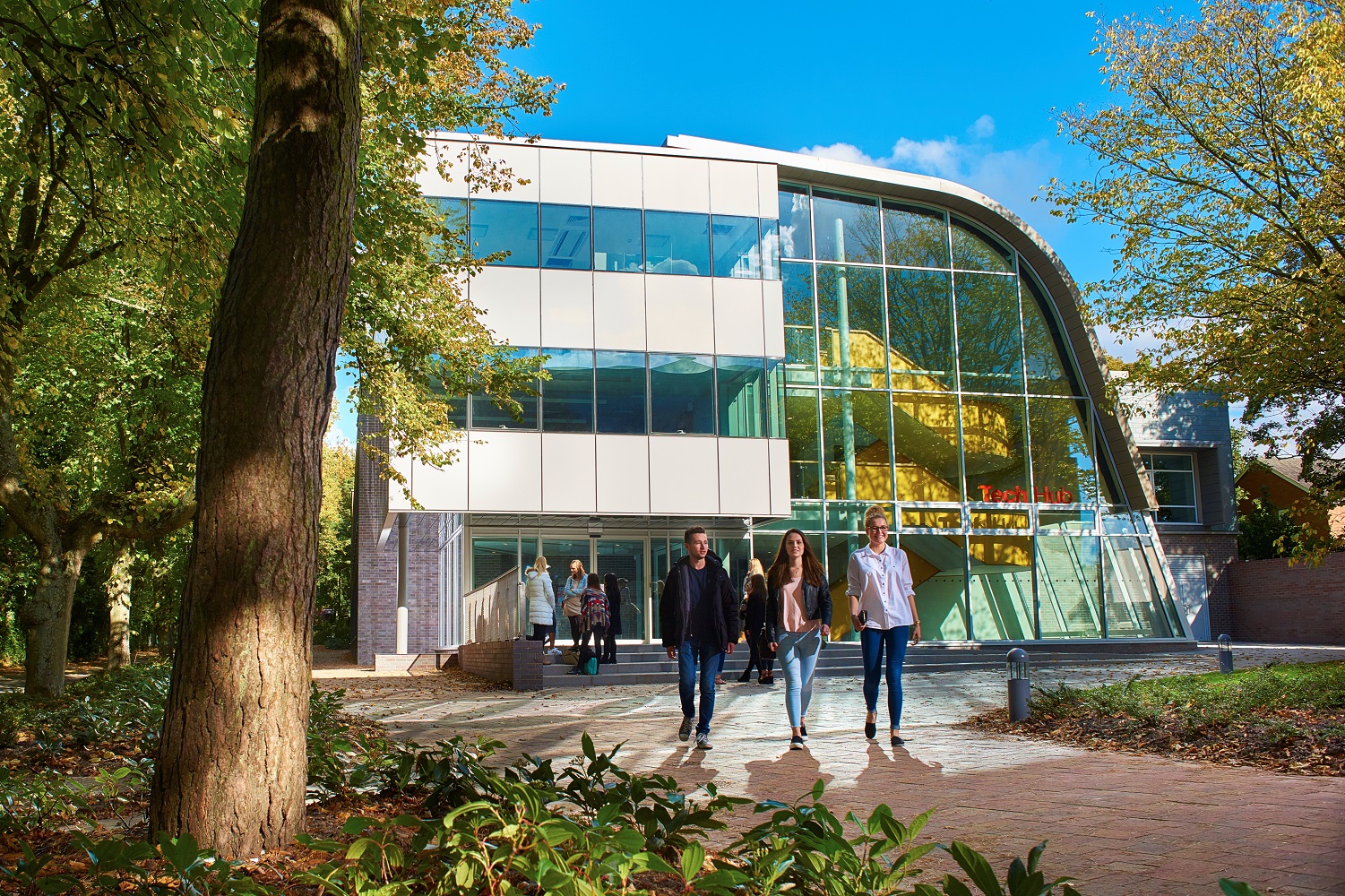 The Department of Computer Science is based in the state-of-the-art £13million Tech Hub. This purpose-built development offers highly contemporary suites of outstanding facilities for Computer Science and Engineering students. Our modern computing and engineering laboratories are equipped with comprehensive test and measurement equipment, high-specification computers, high-resolution screens and the latest hardware and software.
The Department of Computer Science is based in the state-of-the-art £13million Tech Hub. This purpose-built development offers highly contemporary suites of outstanding facilities for Computer Science and Engineering students. Our modern computing and engineering laboratories are equipped with comprehensive test and measurement equipment, high-specification computers, high-resolution screens and the latest hardware and software.
A four-screen CAVE (Computer Augmented Virtual Environment) provides a super immersive 3D virtual environment, enabling users to immerse themselves in a virtual room and experience real life scenarios in 4K resolution. There are also specialist laboratories for networking and games programming, in addition to a specialist research laboratory, open access laboratory and a Harvard style lecture theatre.
Where you'll study
Tech Hub
Learning resources
Learning resources include robots and a robotics simulator, wired and wireless networking hardware, graphics software, web development tools, software development environments, big data servers, eye trackers, giant 3D interactive teaching screens, and other specialist software required for studying forensics and internet security techniques.
Finance
Tuition fees
UK Full-Time
£9,250
a year
UK Part-Time
£77 per credit
for 360 credits
International
£16,500
a year
EU/EEA and Swiss students who have settled or pre-settled status under the EU Settlement Scheme, as well as Irish nationals, may be eligible for the UK tuition fee rate.
Financial support
Subject to eligibility, UK students joining this course can apply for a Tuition Fee Loan from the Government to cover the full cost of tuition fees. UK students enrolling on the course may also be eligible to apply for additional maintenance loan funding to help with living costs. Please view the relevant Money Matters guide for comprehensive information about the financial support available to eligible UK students, together with details of how to apply for potential funding.
EU/EEA and Swiss students who have settled or pre-settled status under the EU Settlement Scheme may be eligible to apply for financial support. Irish nationals can ordinarily apply to Student Universal Support Ireland (SUSI). If you are an EU student who does not have settled or pre-settled status, or are an international student from a non-EU country, please see our international student finance pages.
Your future career
You’ll leave us with the skills and knowledge to launch your career in computer science and artificial intelligence. Jobs you could apply for include Software Engineer, Data Scientist, and Business Intelligence Manager.
Our graduates are ready to work in many different industries, such as:
- automotive
- aerospace
- finance
- petrochemical
- biomedical
- manufacturing
- energy
If you prefer to pursue an academic path, you can apply for a range of computing master’s as the next step on a route to a PhD.
Course changes
Every effort has been made to ensure the accuracy of this information, however our courses are subject to ongoing review and development. Changing circumstances may necessitate alteration to, or the cancellation of, courses.
Changes may be necessary to comply with the requirements of professional bodies, revisions to subject benchmarks statements, to keep courses updated and contemporary, or as a result of student feedback. We reserve the right to make variations if we consider such action to be necessary or in the best interests of students.

